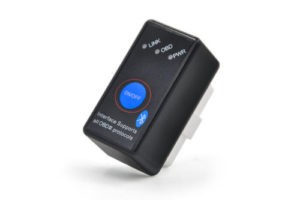The Obdii Bluetooth Dongle, often referred to as an ELM327 adapter, is a crucial tool for modern car diagnostics. It acts as the bridge between your vehicle’s computer and your smartphone or tablet, enabling you to use car scanner apps for tasks ranging from reading error codes to monitoring real-time performance data. Selecting the correct OBDII Bluetooth dongle is paramount, influencing both the ability to establish a connection with your car and the quality of that connection. A poorly chosen adapter can lead to frustration, unreliable data, or even potential issues with your vehicle’s electronic systems.
If you’re looking for a quick recommendation on which adapter to buy and where to find it, you can skip directly to our recommendations section. However, understanding the nuances of these devices will ensure you make an informed decision.
What Exactly Are ELM327 OBDII Bluetooth Dongles?
When selecting an ELM327 OBDII Bluetooth dongle, two primary considerations come into play. First, compatibility with your smartphone or tablet’s operating system is essential. This hinges on the type of wireless connection the dongle utilizes. Second, quality is non-negotiable. A high-quality adapter will reliably perform its diagnostic functions without glitches or freezes, whereas a substandard one can introduce a host of problems.
Types of OBDII Bluetooth Dongles by Connection
OBDII Bluetooth dongles vary primarily by their connection type. Understanding these differences is key to choosing the right one for your needs and devices:
- Wi-Fi: These dongles connect via a Wi-Fi network.
- Bluetooth Classic (Versions 1.x, 2.x, 3.x): Utilizing classic Bluetooth technology.
- Bluetooth Low Energy (LE) (Version 4.0 and above): Designed for low power consumption, using Bluetooth LE. It’s important to note that Bluetooth and Bluetooth LE are distinct communication methods despite the similar name.
- Bluetooth MFi: This is classic Bluetooth specifically certified by Apple for use with iPhones and iPads. Manufacturers of these dongles must undergo a certification process with Apple, making them less common. Examples include OBDLink MX+ and vLinker FS. On Android devices, these typically function as standard Bluetooth adapters.
- USB: While USB OBDII adapters exist, they are not compatible with car scanner apps designed for smartphones and tablets, including Car Scanner.
The optimal choice of connection type largely depends on your smartphone or tablet’s operating system.
Choosing an OBDII Bluetooth Dongle for Apple iOS (iPhone/iPad)
Apple iOS devices, including iPhones and iPads, offer compatibility with Bluetooth LE (4.0), Wi-Fi, and Bluetooth MFi OBDII dongles. It’s crucial to understand that classic Bluetooth adapters (versions 1.x, 2.x, 3.x) are not supported by iOS due to inherent limitations within the operating system’s architecture. This restriction is absolute and applies across all apps; no workaround exists.
Recommendation for iOS Users: For iPhones and iPads, Bluetooth LE (4.0) OBDII dongles are generally the best choice. They provide a balance of easy connectivity, satisfactory data transfer speeds, and availability. If you require the absolute highest speed and are willing to invest more, Bluetooth MFi adapters are an option. Wi-Fi adapters, while compatible, can sometimes introduce connection complexities and may interfere with your device’s mobile internet connection.
Bluetooth Version is Critical for iOS: This point cannot be overstated, especially for iPhone and iPad users. Many iOS users mistakenly purchase classic Bluetooth adapters, only to find they are unusable with their devices. This limitation is not app-specific but a fundamental constraint of the iOS operating system.
Selecting an OBDII Bluetooth Dongle for Google Android
Google Android devices offer broader compatibility, supporting OBDII dongles with classic Bluetooth (versions 1.x, 2.x, 3.x), Bluetooth LE (4.0), and Wi-Fi connections. For Android, classic Bluetooth OBDII dongles are often recommended. They generally offer faster data transfer rates compared to Bluetooth LE (4.0) and tend to be more reliable than Wi-Fi connections. A vast majority (approximately 95%) of Android users opt for classic Bluetooth adapters.
However, a potential drawback to consider is that some Android devices may experience conflicts when simultaneously connected to multiple Bluetooth devices, such as both an OBDII adapter and a car’s Bluetooth multimedia system.
Quality Matters: Avoiding “Bad” ELM327 OBDII Adapters
Forget outdated notions about specific ELM327 adapter versions, internal chips, or circuit board layers. These factors are no longer reliable indicators of quality. Counterfeiters have become adept at mimicking these characteristics in low-quality adapters, while reputable manufacturers are producing excellent adapters using diverse components. The version number printed on clone adapters is often arbitrary and meaningless.
The critical distinction is between “good” and “bad” ELM327 OBDII adapters. A good adapter simply functions as intended – reliably, consistently, and without errors. Your primary objective is to secure a good quality OBDII Bluetooth dongle. Substandard or “bad” adapters are plagued with a range of issues.
Problems with Low-Quality OBDII Bluetooth Dongles
- Complete Failure: The adapter may not work at all, failing to establish any connection.
- Unstable Operation: Intermittent functionality is common. A bad adapter might freeze, spontaneously reboot, or cease working after a short period. Temperature or humidity changes can also trigger failures. Connectivity and data availability may fluctuate unpredictably.
- Limited Command Support: Many cheap adapters only support a subset of essential OBDII commands, despite claiming full compatibility. Deceptive adapters may falsely report support for all commands.
- Fixed ECU Address: Some adapters are hardcoded to communicate only with a specific Engine Control Unit (ECU) address, preventing communication with other ECUs in your vehicle.
- Data Length Restrictions: Poorly designed adapters may impose limitations on the length of data requests and responses, hindering comprehensive diagnostics.
- Data Loss: Data transmission errors are frequent. Packets of data sent by the ECU may be incompletely received or lost entirely, resulting in corrupted or incomplete information.
- Data Corruption: Data can be distorted during transmission in either direction. This poses a serious risk, as sending an unintended command due to data corruption could have detrimental effects on your vehicle’s systems.
- Protocol Incompatibility: Substandard adapters may only support a limited range of OBDII communication protocols. If your vehicle uses an unsupported protocol, the adapter will be incompatible, even if it works with other vehicles.
- On-Board Network Interference: Critically, faulty adapters can inject spurious data or requests onto your car’s on-board network. This “noise” can disrupt the ECU’s ability to control the engine and other systems, potentially causing engine roughness or other performance issues.
- Unsuitability for Advanced Functions: If you intend to use your OBDII Bluetooth dongle for advanced functions like ECU coding or service procedures, a high-quality adapter is mandatory. Data writing to the ECU is a sensitive operation that demands a reliable and accurate adapter. A poor adapter can lead to unsuccessful procedures at best, or, at worst, corrupt ECU data, potentially causing severe vehicle malfunctions.
The Pervasive Problem of Bad Adapters
It is crucial to recognize that bad OBDII Bluetooth dongles are alarmingly prevalent in the market. The likelihood of purchasing a defective adapter is significant. You might purchase multiple adapters in succession and find each one to be unreliable.
Recommended OBDII Bluetooth Dongles
Disclaimer: I do not sell OBDII adapters. The following recommendations are based on my experience and feedback from Car Scanner app users.
The following are, in my opinion, worthy OBDII Bluetooth dongles, listed roughly from most expensive to least expensive:
OBDLink MX+ with Bluetooth MFi (#ad link). Around $100 USD. Compatible with both iOS and Android. This is the most feature-rich and high-performance adapter available.
OBDLink CX with Bluetooth LE (#ad link). Approximately $80-$100 USD. iOS and Android compatible. Known for its large memory buffer and exceptional performance.
vLinker Devices: A range of reliable options from vLinker:
- vLinker MC+ with Bluetooth LE (#ad link)
- vLinker FS with Bluetooth MFi (#ad link)
- vLinker MS with Bluetooth MFi: vLinker’s attempt to compete with OBDLink. Early versions had issues, but firmware updates have significantly improved their performance, making them very good options.
For iOS, MC, MC+ (Bluetooth LE), FS (Bluetooth MFi), or MS (Bluetooth MFi) are recommended. For Android, any vLinker model is suitable. Remember to choose Bluetooth for Android and Bluetooth LE for iOS. Check for firmware updates for optimal performance, downloadable from the manufacturer's website.Vgate iCar Pro 2S: A newer, improved version replacing the iCar Pro BLE. If choosing between these two, the iCar Pro 2S is the better option.
Vgate iCar Pro BLE (#ad link): This adapter uses both Bluetooth 2.0 and Bluetooth 4.0 chips, ensuring compatibility across iOS, Android, and Windows. Important: Older firmware versions (prior to v.4.1.02 from 2021/01/08) had issues with CAN Extended addressing, used in Toyota and BMW vehicles. Firmware updates are essential to resolve this. Download the latest firmware for Vgate iCar Pro here.
OBDII Bluetooth Dongles to Absolutely Avoid
To help you steer clear of problematic devices, here is a list of OBDII Bluetooth dongles and characteristics to avoid:
- xTool Adapters: These are not ELM327 compatible and are proprietary to xTool software.
- Wired Adapters (USB, COM): Car Scanner and similar apps exclusively support wireless adapters.
- “Mini” Adapters: Adapters with “mini” in their name have a very high probability (99%) of being low-quality.
- Extremely Cheap Adapters: Unusually low prices are a significant red flag.
- Bluetooth MAC Addresses Starting with 11:22:33 or 00:00:00: These are often associated with generic, low-quality clones.
- KONNWEI Devices: While previously recommended, KONNWEI adapters have experienced a decline in quality and frequently exhibit data packet loss.
- “Micro Mechanic” Adapters: Many users report these adapters failing after minimal use.
- “THINMI.COM” Adapters: These offer limited ELM327 command support and are known to generate fake responses.
- KUULAA Brand Adapters: Generally unreliable.
- Adapters with This Generic Design: While some may function, the majority of adapters with this common, generic appearance are of very poor quality.
 Generic bad elm 1
Generic bad elm 1
 Generic bad elm 2
Generic bad elm 2
 Generic bad elm 3
Generic bad elm 3
 Generic bad elm 4
Generic bad elm 4
 Generic bad elm 5
Generic bad elm 5
In Conclusion
Choosing the right OBDII Bluetooth dongle is essential for reliable car diagnostics. Prioritize compatibility with your operating system and, crucially, focus on quality over price. Investing in a reputable brand and avoiding the “bad” adapter characteristics outlined in this guide will save you frustration and ensure accurate and safe interaction with your vehicle’s computer systems. Remember, a quality OBDII Bluetooth dongle is an investment in your car’s health and your diagnostic capabilities.
P.S. Links on this page direct to Amazon.com and as an Amazon Associate, I may earn from qualifying purchases.

